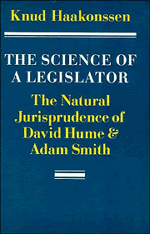Book contents
- Frontmatter
- Contents
- Acknowledgements
- List of abbreviations
- Chapter 1 Introduction
- Chapter 2 Hume's theory of justice
- Chapter 3 Smith's moral theory
- Chapter 4 Smith's theory of justice and politics
- Chapter 5 Smith's analytical jurisprudence
- Chapter 6 Smith's critical jurisprudence
- Chapter 7 Smith's historical jurisprudence
- Chapter 8 Natural jurisprudence in the face of history
- Notes
- Bibliography
- Index
Chapter 6 - Smith's critical jurisprudence
Published online by Cambridge University Press: 04 April 2011
- Frontmatter
- Contents
- Acknowledgements
- List of abbreviations
- Chapter 1 Introduction
- Chapter 2 Hume's theory of justice
- Chapter 3 Smith's moral theory
- Chapter 4 Smith's theory of justice and politics
- Chapter 5 Smith's analytical jurisprudence
- Chapter 6 Smith's critical jurisprudence
- Chapter 7 Smith's historical jurisprudence
- Chapter 8 Natural jurisprudence in the face of history
- Notes
- Bibliography
- Index
Summary
Introduction
The predominant mode in both The Theory of Moral Sentiments and in the Lectures on Jurisprudence is descriptive. We are told what people consider morally right and what the law recognizes as injustice, not what is right or unjust. This has led one commentator to the conclusion that ‘it is possible to interpret Adam Smith as making no ethical statements at all, that is, solely as a moral psychologist engaged in analysing and explaining acts of approval and disapproval’. Another commentator agrees that ‘this is the correct interpretation of the Moral Sentiments (provided that the term “psychologist” is not taken to exclude a sociological approach)’. According to this view of Smith as the scientist of morals it was never part of his intentions to be the moralist who tells men what is right and wrong. In so far as he brings in his own evaluations at all it is at a contemplative level, where he, with the few philosophers, legislators and scientists who have the ability, tries to take a God's-eye view of mankind in its moral aspect – which means in its social life. From this elevated vantage point he will judge everything in terms of its utility, admiring the way God has brought about a universal order which secures the basic happiness of man. On weekdays this order provides the scientist with his explanatory tasks, on Sundays it stands as the object of the contemplative utilitarian's admiration.
- Type
- Chapter
- Information
- The Science of a LegislatorThe Natural Jurisprudence of David Hume and Adam Smith, pp. 135 - 153Publisher: Cambridge University PressPrint publication year: 1981

